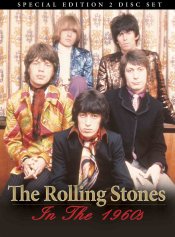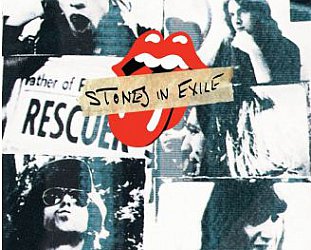Graham Reid | | 2 min read
The Rolling Stones: Stray Cat Blues (from Beggar's Banquet, 1968)

We have been down this occasionally interesting path previously with the Chrome Dreams label which has delivered DVDs about bands such as the Small Faces, the whole German electronic movement (Kraftwerk, Can et al) and Frank Zappa, as well as CDs of Bob Dylan's jukebox and a compilation of his Radio Hour music (no intros by Bob though).
None of the DVDs are authorised by the management of the people in question and so they rarely have interview footage, and unfortunately they go to the same few talking heads (among them the astonishingly irritating, joyless Alan Clayson who pontificates and condescends while soundling like a man sitting on uncomfortable collection of nagging piles).
But as fairly decent chronologies punctuated by excellent period footage, these films are certainly worth a look. This double disc collection includes contributions by Dick Taylor (who was in an early Stones band with Jagger, Jones and Richards and went on to the Pretty Things) as well as the likes of journalists Nigel Williamson, Chris Welch and others, plus singer Chris Farlowe, all of whom dissect the rise of the Stones via their singles and albums.
And all make the point (except the annoying Clayson who seems to contradict himself) that up until '66 the Stones were a singles band.
The footage mostly comes from live shows so the sound often isn't the best, but you can feel the heat and energy coming from the stage -- and witness the increasingly chaotic scenes at their shows. Jagger brings an extraordinary sense of menacing stillness to Little Red Rooster.
Even when Mick Jagger and Keith Richards had become a powerful songwriting force and had marginalised the band's founder Brian Jones, the cameras still focus on Jagger and Jones, with Richards somewhere off on the side. His presence isn't felt until the second disc which picks up the story from '67 onwards.
But all rightly credit Jones with being much more significant musically in the band's first five years than he has been given credit for. After that he was a lost boy.
The second disc is by far the more interesting for a number of reasons: the band became more trans-Atlantic after the debacle of Their Satanic Majesties (although a couple of journos defend it eloquently) so American commentators like the droll Robert Christgau come in; Jagger made the Performance movie and Goddard filmed them in the studio for his 1+1 movie (excellent footage from both) and there is the rise of Richards as a potent directional force, the tragedy of Jones and all that followed.
Necessarily, much is dusted over lightly (Bill Wyman and Charlie Watts are barely mentioned) and this would have been much better if the Stones had been allowed to speak for themselves. That's a curious omission because Chrome Dreams has a four CD set As It Happened of Stones interviews from various press conferences etc and it's hard to understand why they wouldn't have used some of that material here.
The Stones story has been well canvassed on DVD -- I have a five DVD set Just For The Record which is similar and was astonishingly cheap -- but if you (or your children/grandchildren/music students) want to get some sense of the musical growth of the band then this is a useful if hardly essential overview.







Rob Smyth - Aug 27, 2012
"Satanic Majesties" a debacle? Well, that was the prevailing critical viewpoint at the time of its release. But then people thought "Sgt. Pepper's" was a great album at the time. Now we know better.
Save"Satanic Majesties" is now rightly acknowledged as one of the greatest albums of its time, and sits behind "Between the Buttons" and "Aftermath" in the Stones' best three.
post a comment